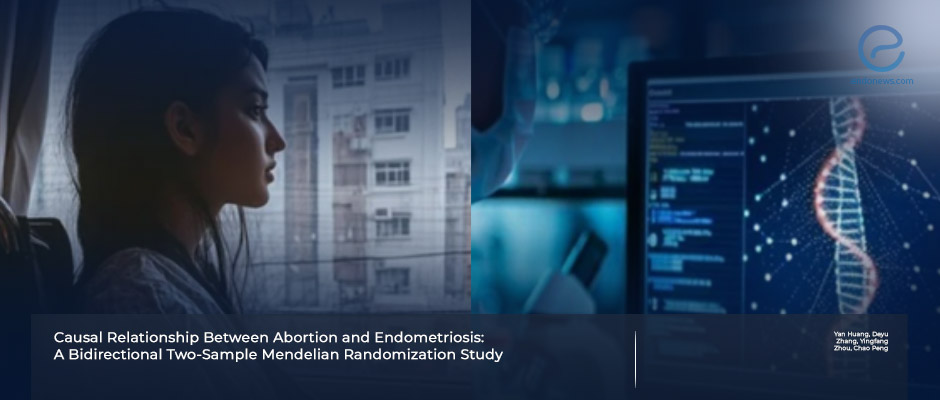Abortion and Endometriosis: No Causality Found
May 22, 2025
Endometriosis Not Triggered by Abortion Events, Genetic Analysis Shows
Key Points
Highlights:
- Mendelian randomization methods showed no causal association between endometriosis and any type of abortion, including medical, spontaneous, or other forms.
Importance:
- Spontaneous abortion is a common reproductive event often discussed in relation to endometriosis, with hypotheses linking the two through inflammatory or hormonal mechanisms.
- Observational studies have previously reported associations, but causality remains unclear due to potential confounders.
What's done here:
- Researchers from Peking University conducted a bidirectional two-sample Mendelian randomization study to evaluate the potential causal relationship between endometriosis and various types of abortion.
- Genetic instruments were selected from large GWAS datasets (IEU OpenGWAS, UK Biobank, FinnGen) involving European populations.
- The analysis included three abortion categories: medical, spontaneous, and other/unspecified abortions.
- The inverse variance weighted method was the primary approach, supplemented by sensitivity analyses including MR-Egger, weighted median/mode, MR-PRESSO, and Leave-One-Out.
Key Results:
- GWAS sample sizes used included:
- 20,570 cases and 89,340 controls for medical abortion
- 9,113 cases and 16,379,138 controls for spontaneous abortion
- 114 cases and 89,340 controls for other types of abortion
- Odds ratios from IVW analysis showed no evidence of causality: Not for Medical abortion, nor pontaneous abortion or other abortions.
- Reverse-direction analysis (endometriosis → abortion) also showed no significant associations across all models.
- Sensitivity analyses confirmed the robustness of results, with no evidence of horizontal pleiotropy or heterogeneity.
From the Editor-in-Chief – EndoNews
"This study addresses a sensitive and long-debated issue in reproductive medicine—whether abortion and endometriosis are causally linked. By applying rigorous genetic methodology across large biobank datasets, the authors offer a clear and reassuring answer: there is no evidence of causality in either direction.
Their bidirectional Mendelian randomization approach strengthens the credibility of these findings and highlights the value of genetic epidemiology in resolving complex clinical associations.
A timely and well-executed study, particularly in light of persistent misconceptions in both clinical practice and public discourse."
Lay Summary
Endometriosis is a chronic condition that can lead to infertility or delayed childbirth, often accompanied by symptoms such as prolonged menstrual bleeding, dysmenorrhea, dyschezia, dyspareunia, and chronic pelvic pain. Among its many debated associations, spontaneous abortion (miscarriage) has frequently been suggested as a possible consequence of or contributor to endometriosis, though a causal relationship has never been clearly established.
To address this question, a research team led by Drs. Zhou and Peng from Peking University conducted a large-scale genetic study using bidirectional Mendelian randomization, a method that helps detect potential causal links between conditions by analyzing genetic variants. The team utilized genome-wide association study (GWAS) data from the FinnGen biobank and UK Biobank, focusing on women of European ancestry.
They assessed three types of abortion: spontaneous, medical, and other/unspecified types. Genetic instruments were used to examine whether any of these abortion types could causally influence the risk of endometriosis — and vice versa. The inverse variance weighted (IVW) method was applied as the primary statistical approach, supplemented by sensitivity analyses to ensure robust and unbiased findings.
The results revealed no causal association in either direction. That is, women with endometriosis were not genetically predisposed to experience abortions, and women who had abortions did not have an increased genetic risk for developing endometriosis. Sensitivity analyses confirmed the reliability of these findings, showing no evidence of bias or confounding.
The authors acknowledged that the results reflect European genetic data and that other genetic, environmental, or clinical factors could influence outcomes differently in other populations. Still, this well-controlled study provides strong evidence to challenge long-standing assumptions about a causal link between abortion and endometriosis. The findings were recently published in the American Journal of Reproductive Immunology.
Research Source: https://pubmed.ncbi.nlm.nih.gov/40028715
Mendelian randomization odd ratios abortion single nucleotid polimorphism causality endometriosis.

